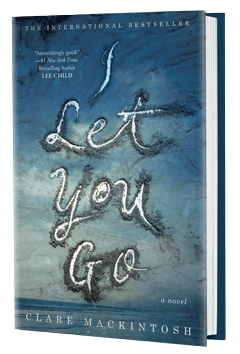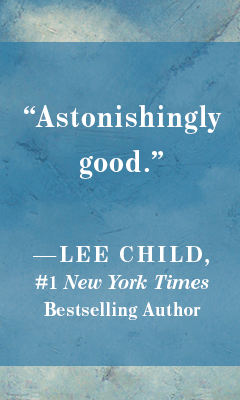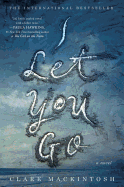I Let You Go
by Clare Mackintosh
One minute, a young mother is walking home with her five-year-old son. The next, he's dead, hit by a car after letting go of his mother's hand to run ahead. As if the situation weren't nightmarish enough, the driver takes off without stopping.
Detective Inspector Ray Stevens of the Bristol Criminal Investigations Division catches the case, along with his junior officer, Detective Constable Kate Evans. Though Stevens has developed coping mechanisms to deal with the heartrending situations he encounters at work--"If he thought too long about how it must feel to watch your child die in your arms, he would be no use to anyone"--Kate, new to CID, is upset by little Jacob's death.
Jenna Gray is also shattered by the car accident. Mourning her son, she leaves her house one day and hops on a bus with no destination in mind, wanting only to get lost. She ends up in a remote Welsh seaside town called Penfach, rents a rundown cottage, and starts rebuilding her life where no one knows who she is or anything about her devastating past.
Months pass, and there's still no arrest in the hit-and-run that killed Jacob, despite all the attention it receives, with the little boy's picture splashed on the front pages of newspapers. Though long ordered by the chief constable to close the case, Kate keeps working on it on her own time, and eventually convinces Ray to review the old files, too. Then, to mark the one-year anniversary of Jacob's death, the police make a public appeal for any new information.
The appeal results in a tenuous lead for the car, but Ray and Kate work it until they have a solid clue about the guilty driver's identity. What happens next upends Jenna's life, for nothing is as it appears, and the cops find they're far from closing the case.
It's hard to believe I Let You Go is Mackintosh's debut novel because it's so assured. From plotting to characterizations, the author skillfully takes readers inside the frustrations of police officers trying to solve a high-profile case with very little information to go on, and on the flip side, what a mother's grief looks like when she loses a child. Jenna's ordeal is raw, but she's a riveting character, at once fragile and resilient, from whom it's hard to look away. Readers will be fully invested in the emotional journey she goes on, keenly feeling her open wounds and tentative hope as she tries to forget her past and move on.
Ray and Kate are engaging characters, too, providing the yin and yang of the investigation--he the veteran rediscovering the hunger he used to have as a young detective ("I like to have [the victim's photo] where I can see it.... Where I can't forget what I'm doing, why I'm working these hours, who it's all for"), and she the newbie whose idealism lights a fire in her senior partner. She also sparks feelings in Ray that aren't entirely platonic, which is problematic since he's married with children. (How Kate handles the situation is refreshingly free of neuroses.) To add to Ray's turmoil, it seems his son is being bullied at school. All this provides well-rounded pictures of the police behind the procedural and realistic rhythms in their dialogue, perhaps owing to the fact that Mackintosh spent 12 years as a police officer herself.
There is a third narrator who adds a whole new angle to the case, but saying any more would spoil the story.
The author doesn't just conjure up memorable characters and gripping plots; her settings ring true. Penfach--with the cliff-strewn coastline--and its people are warm and hard, breathtaking for their beauty and harshness. It makes perfect sense for Jenna to choose it as a place to run away to, someplace that might allow her to heal but perhaps not let her forget the jagged edges of her pain. Mackintosh is also very good at keeping readers ensnared in suspense. The most impressive feat Mackintosh pulls off is the bombshell that's on the level of the movie The Sixth Sense for its cleverness. Readers who say they saw it coming are most likely fibbing. The revelation is so good, readers might want to reread I Let You Go to see how it changes their perceptions--even the title takes on different interpretations--and whether or not the twist holds up. It does. This kind of sharp, cunning writing makes one eagerly look forward to Mackintosh's next novel. --Elyse Dinh-McCrillis








